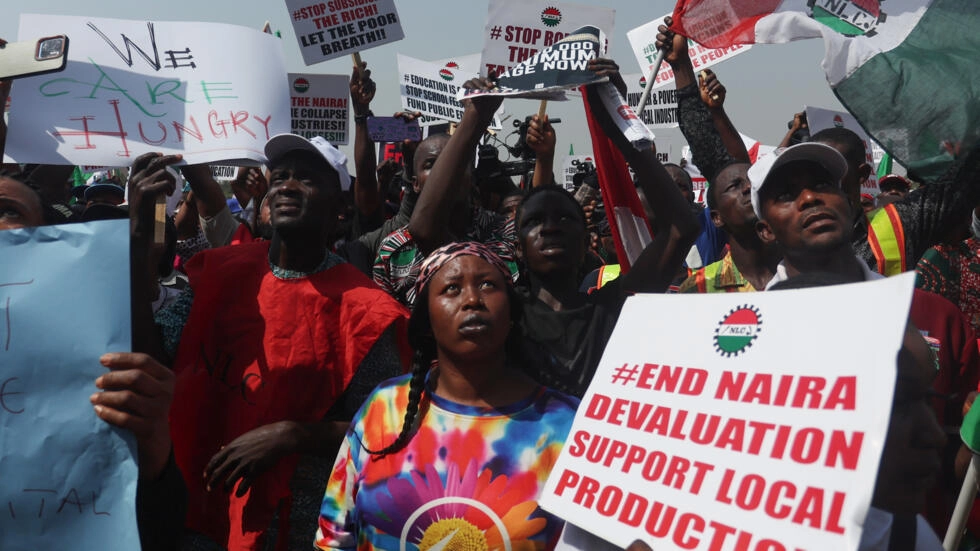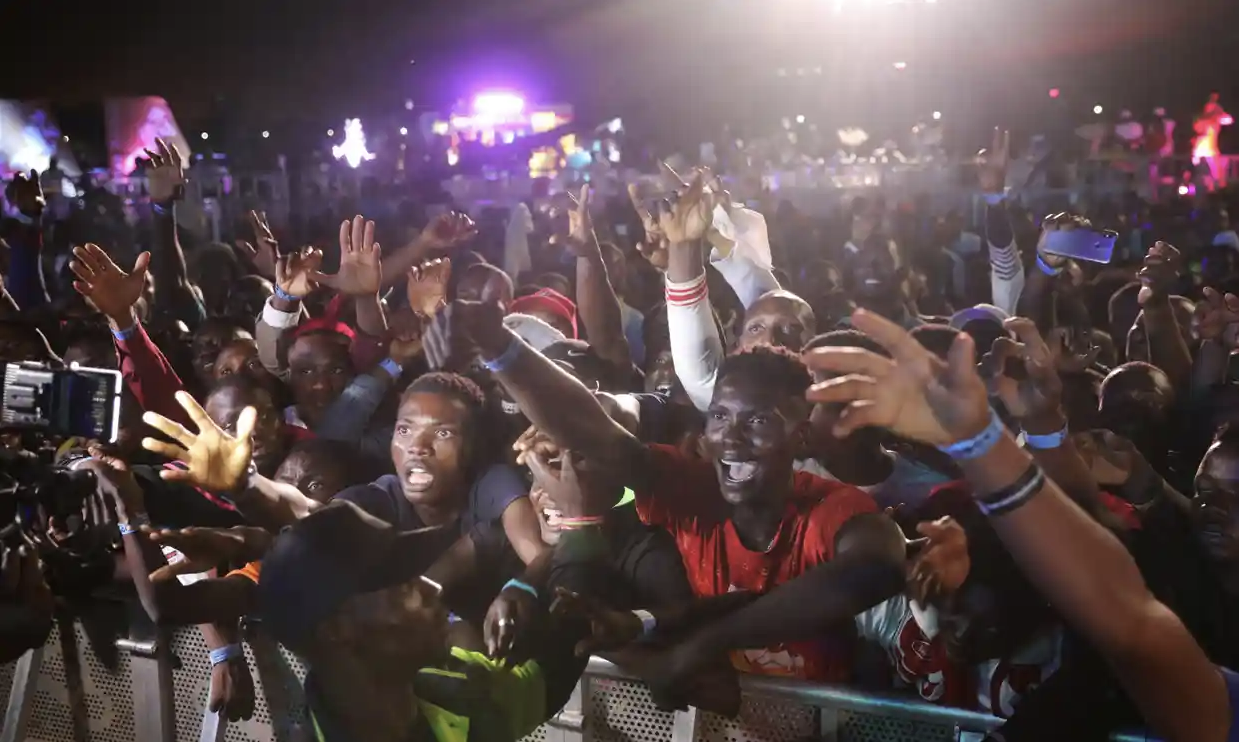This article is more than
7 year oldWhat it’s like to be kidnapped — and saved — from Boko Haram
At 11:34pm hundreds of young girls, asleep in their beds, wake to the sound of gun fire. Armed attackers have ambushed their boarding school in the remote northeastern Borno state of Nigeria and set fire to its buildings.
Boko Haram, an Islamic extremist group that has been terrorising villages for years in collaboration with Islamic State, ambush the Government Girls Secondary School in Chibok and drag 276 girls out of their beds.
Their teachers, security, the military, are nowhere to be seen. Most have left for the night, leaving these young girls helpless and hopeless.
Terrified, they are forced out of their dormitories and onto trucks, where they are transported deep into the African jungle. Fifty seven girls manage to escape.
For the rest, it would be the beginning of a nightmare that for some, ended overnight after a prisoner exchange brokered by the International Committee of the Red Cross. 82 girls released as part of an exchange for several militant commanders.
But for many more, the nightmare continues.
A nightmare that exposed the inability of its government to protect its citizens and which failed to protect so many young girls from three years of sexual torture.
My remarks this evening, when I received 82 of our daughters who have just regained their freedom from Boko Haram—https://t.co/1EJpqajzXW pic.twitter.com/GvATCpJrZj
— Muhammadu Buhari (@MBuhari) May 7, 2017
By 2014, tens of thousands of people had already been killed in various attacks by Boko Haram, their power seemingly unstoppable.A happy site for families missing loved ones: Some of the 82 released #ChibokGirls board an aircraft. pic.twitter.com/9yiJOUocQe
— ICRC Africa (@ICRC_Africa) May 7, 2017
The insurgency in north east Nigeria saw churches, mosques and markets attacked. Entire villages demolished. More than 30,000 dead. More than two million forced out of their homes. Residents killed in firebomb attacks. Shot. Hacked to death. Raped.
The jihadist terror group, whose name translates to “western education is forbidden”, begin targeting schools in 2010 in a bid to enforce Islamic principles.
Girls are targeted in particular; to Boko Haram a woman’s place is in the kitchen, or as a sex slave. There is no need for education.
“When they [Boko Haram] came in they told us to stay together, we should not run, we were thinking maybe they were military, they were wearing military uniforms,” one of the Nigerian school girls who escaped, who goes by the name “Saa”, told the Geneva Summit for Human Rights and Democracy.
Saa is wearing large sunglasses during her talk, disguised “to try and make it harder for Boko Haram to identify her,” the MC explains before her discussion.
“Her family, her parents, her brothers are still in Nigeria and they may be targeted specifically because Saa is briefly speaking out”.
Saa begins to share her experience of the kidnapping. Notably, she recalled the group of militants asking the girls specific questions.
“Where are the boys?” (School boys did not board at the school, they went home after classes).
“Where is your security”? (Security left the girls overnight and would return in the morning).
“Where is your food kept?”
Saa says that as the group of girls answered the militant men’s questions, they began to figure it out. These men were Boko Haram.
“They didn’t allow us to take anything from our rooms, they started bombing the school, then they tell us we should move out,” Saa recalls.
“We were scared, we didn’t even talk.”


Boko Haram brought in a “long truck” to transport the girls. But there were too many girls to transport in the one truck. Some were forced to walk on foot, aiding in the means necessary for a handful of them to escape. A few others inside the truck, like Saa, joined the escaping girls. An opportunity had arisen where they could escape without being caught. It was now or never.
“We were in the middle of the forest and it was night time. Some of us decided to jump down out of the truck and hide somewhere so we should find a way to escape,” Saa said.
“Two girls jumped down, I decided to jump down out of the truck. I’d rather die than to go with Boko Haram.
“I told one of my friends, this is my decision. She said she would jump with me.”
But Saa’s friend broke her ankle in the escape. Lost and stuck in the African forest, safety seemed a miracle away.
The next morning, however, and unaware of their location, Saa set off to look for help.
She eventually found a shepherd, who would save Saa’s life.
Saa — along with nine other girls — would never see her friends in the trucks again, despite others who have managed to escape in the past three years.
Those girls would later detail the abuses; some of their friends would die from illness. Others would become radicalised by their captors. Some human rights groups fear some of the girls were used to carry out suicide bombings.
“They will face a long and difficult process to rebuild their lives after the indescribable horror and trauma they have suffered at the hands of Boko Haram,” said Pernille Ironside, acting representative of UNICEF Nigeria.
According to another rescued schoolgirl, the girls would spend the first year in Boko Haram’s lair, the Sambisa Forest. Some were sent to be married.
“I escaped from Boko Haram, my mum gave me the courage to run,” one told CNN in August last year.
“I am sending a message to my sisters. Please, be patient. And be prayerful. The way God rescued me from the Sambisa Forest, he will rescue you too. Be hopeful.”
Almost a month after the kidnapping, Boko Haram leader Abubakar Shekau released a video claiming responsibility for the kidnapping, and vowed to sell them as slave brides.
A week later, he reappears, this time in a chilling video with a large handful of the kidnapped schoolgirls. He says they have converted to Islam and will not be freed until militant fighters held in custody are freed.
A year passes, then another.
A social media storm erupts with the Michelle Obama hashtag #BringBackOurGirls, but little seems to be done within the Nigerian government.
Two years pass, until May 18, 2016, when the Nigerian Army confirms the first of the kidnapped girls has been found alive; a 19-year-old. She is found near Boko Haram’s Sambisa Forest enclave with a man she describes as her husband — and a four-month-old baby.
In October, 21 more girls are liberated through a deal brokered by Switzerland and the International Red Cross, where they began trauma counselling and have remained since.
Overnight, a group of 82 girls met Nigerian President Muhammadu Buhari in the capital Abuja a day after news broke of a release in exchange for several militant commanders.
“I cannot express in a few words how happy I am to welcome our dear girls back to freedom,” Buhari told the girls surrounding him in his residency, a presidency statement said.
“On behalf of all Nigerians, I will like to share my joy with you,” he told the girls, who were seen clapping, according to an official picture of the meeting.
The government secured the release with mediation by the International Committee of the Red Cross. A military source said three Boko Haram commanders had been freed in an exchange, but declined to give further details.
Photographs released by the ICRC showed a line of girls wearing vests emblazoned with the charity’s logo waiting to board a military helicopter. The military source said the girls had been flown from Banki near the border with Cameroon to Maiduguri and then Abuja, where they first got a medical check-up at a police hospital before being driven in two buses to the presidential villa.
Their meeting with the president apparently took place before they were reunited with their parents and relatives.

Read More (...)
Newer articles
<p>Chinese officials say they "firmly oppose" the platform being divested.</p>
Ukraine ‘will have a chance at victory’ with new US aid, Zelenskyy says
Congress passes bill that could ban TikTok after years of false starts
Ukraine war: Kyiv uses longer-range US missiles for first time
Who will be Trump’s VP? A shortlist
How soon could US ban TikTok after Congress approved bill?
‘LOSING CREDIBILITY’: Judge explodes at Trump lawyers as case heats up
TikTok faces US ban as bill set to be signed by Biden
KANYE WEST PLANS TO LAUNCH 'YEEZY PORN' ... Could Be Coming Soon!!!
Claim rapper ‘made staff watch her have sex’




